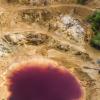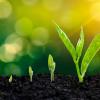
A recent commentary published in Nature, raises concerns about the extensive, yet largely unmeasured, environmental and societal consequences of mining activities worldwide.
Whether fossil fuels for business-as-usual, lithium for batteries, cobalt for smartphones, or neodymium for wind turbines, mineral extraction provides necessary components for the things we use in everyday life and is an indispensable part of our society. However, we know surprisingly little about what’s going on in the mining sector globally and how mining affects the environment, as well as local communities, due to significant knowledge gaps. These gaps leave researchers with a fragmented view of the industry and hamper their ability to track decarbonization strategies, inform policies, and assist decision making.
In their commentary, Victor Maus, a researcher in the Novel Data Ecosystems for Sustainability Research Group of the IIASA Advancing Systems Analysis Program, and Tim Werner from the University of Melbourne, highlight that in recent decades, the global community witnessed a dramatic increase in global demand for mineral resources and this pattern is set to continue into the future due to expanding urban areas and transportation systems, as well as increasing consumption. Yet, mining has severe environmental and societal impacts: it changes land use; causes deforestation; leads to biodiversity loss; pollutes air, water, and soil; poses health hazards; and leads to displacement of communities, loss of land, and livelihoods.
“Independent research is essential to decipher the extent of risks posed by mining and its impacts on the environment and communities all over the globe, as well as to help identify major challenges and build public trust,” notes Maus. “However, this is impossible because of the lack of a comprehensive inventory of the world's mines and the absence of robust data on various aspects of mining operations, for example, waste generation and pollution.”
The reasons for such data scarcity range from limited corporate reporting to disused, informal, or illegal sites. The most worrying revelation in the commentary indicates that around half of the world’s mining impacts remain undocumented.
Maus and Werner propose four key steps to address this challenge. This includes acknowledging and addressing the underestimation of mining impacts and risks worldwide; improving data gathering and sharing practices among scientists; enhancing corporate transparency in the mining sector; and utilizing advanced techniques like remote sensing and artificial intelligence to fill data gaps.
The urgency and scale of this problem cannot be overstated. With the global appetite for minerals expected to rise sharply in the coming decades, especially for clean energy technologies, comprehensive and transparent data on mining impacts is critical. As the authors put it, “We can't manage what we can't measure.”
The authors’ call to action is a wake-up call for researchers, policymakers, and industry leaders to join forces in shedding light on the evident knowledge gaps of the mining sector and mitigating its impacts.
Reference:
Maus, V., Werner, T.T. (2024) Impacts for half of the world’s mining areas are undocumented. Nature, 625, 26-29. DOI: 10.1038/d41586-023-04090-3
News

14 May 2024
Study confirms giant store of global soil carbon and highlights its dynamic nature

13 May 2024
Analyzing the underlying causes of the food crisis in Gaza

02 April 2024

